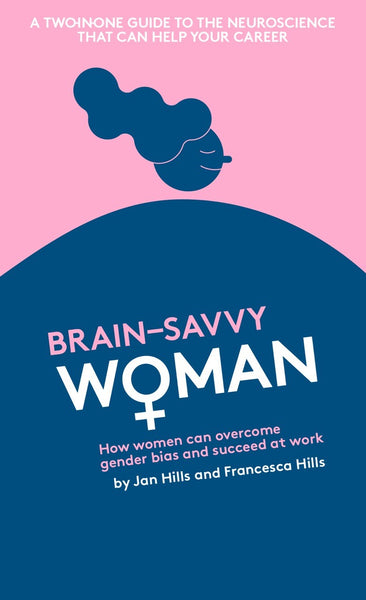
by Jan and Francesca Hills —
A Two-in-One Guide to the Neuroscience That Can Help Your Career
How women can overcome gender bias and succeed at work.
Make your work more satisfying, be more effective, and overcome the bias that can hold you back.
Understand how your brain works, and the shortcuts of thinking that direct most of what we do, how others react to us and us to them. In your everyday job:
• What can you do when you're being side-lined, talked-over, or someone else gets credit for your ideas?
Understand how your brain works, and the shortcuts of thinking that direct most of what we do, how others react to us and us to them. In your everyday job:
• What can you do when you're being side-lined, talked-over, or someone else gets credit for your ideas?
• What to do if your colleagues react badly when you stand up for your point of view?
• Are you too tired to be ambitious?
• Do you dread the words "I need to give you some feedback"?
This book uses the insights of neuroscience to tackle your career challenges from two angles – literally. read more on Amazon...
About the Authors - Jan Hills and Francesca Hills are a mother-and-daughter writing partnership. Jan is a respected leadership consultant; her company Head Heart + Brain works with leaders and organisations in the UK, Europe and Australia. Francesca has a marketing and advertising background and is an executive director in communications planning
The neuroscience focus of the book comes from Jan's longstanding commitment to this approach: she was one of the first people to gain the only academically-recognised qualification in the neuroscience of leadership. "Neuroscience can show why particular policies work, and help leaders and organisations to be even more successful," she says. She is the author / co-author of three books on neuroscience and business practice: Brain-Savvy HR, Brain-Savvy Business, and Brain-Savvy Leading
The inspiration for this particular book came from Jan's post-grad research work at the newly-formed Equal Opportunities Commission, years before Francesca was born. "I assumed back then that traditional male and female work roles would soon be a thing of the past," says Jan, "and we would have equal numbers of male secretaries and female engineers. Some 40 years on I wanted to understand why we'd made so little progress towards that goal, and to ensure that my daughter wouldn't look back from the same stage in her career and see the same snail's pace of progress." Francesca says that the most surprising things she s learned since she first started work was: "You won't always like who you work with, and you won't be able to change that." And the person she learned most from at work was "A boss who had no idea what they were doing!" As for the mother-daughter writing experience, Jan says: "If you ever want to bond a relationship, write a book together!" Francesca says: "My mother is the font of all knowledge and has no limits."
